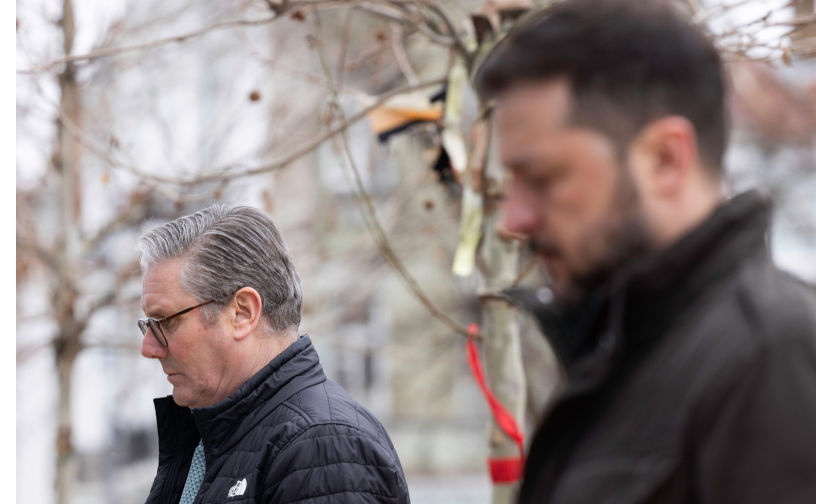UK Prime Minister, Sir Keir Starmer, has been getting ahead of himself of late. At Lancaster House earlier this month, he first proposed to some 18 leaders that a “coalition of the willing” might be cobbled together to protect Ukrainian territory should peace be struck in the Russia-Ukraine War.
His public advisers had evidently failed to remind him that such a term is freighted with historical baggage, given its use by a US-led coalition in its catastrophic, sundering and almost certainly illegal invasion of Iraq in 2003.
On 15 March, a virtual summit involving the leaders of 25 countries was arranged involving potential contributors to such an enterprise, including efforts that would strengthen Ukraine and, in Starmer’s words, “keep the pressure on [Vladimir] Putin to come to the table”. But seeing as there is no peace to keep, the measure is still moored in fantasy.
The absence of the US and Russia from the summit also gave it an air of futility, one having all the seriousness of a vicarage tea party. Any peacekeeping effort being contemplated by Starmer would require a security undertaking from the US. The Trump administration, as things stand, has shown little interest in either a peacekeeping option or a security undertaking, though fickleness may, in time, change that.
This did not stop French President Emmanuel Macron from adding his touch of justification. “Russia does not give the impression of a country that wants peace,” he declared after the summit. “It does not respond to the proposals of the United States and Ukraine. It intensifies hostilities. President Putin wants to get everything and then negotiate.”
Starmer was also in a determined mood, announcing that the participants had agreed to continue military aid to Ukraine and further impair the Russian economy, an effort that has so far failed to significantly hamper its war machine. But the British PM also tended to waffle, talking about the move to an “operational phase” that would involve military chiefs. “Overall, we are successfully gathering political and military momentum.”
The crew being marshalled is also a motley one. Australia and New Zealand were additions from afar. Australian Prime Minister Anthony Albanese, who will soon have to call an election, must have sensed votes in this, pledging that Australia would be committed to Ukraine “for as long as it takes”. This would involve a contribution to peacekeeping, an undertaking necessary to stop the “imperialist designs, for Ukraine and beyond,” nursed by Russian President Vladimir Putin.
Particularly, in Australia’s case, such a foolhardy promise shows that governments are willing to contemplate sending troops to conflicts they ill-understand and have no direct strategic value to them. But seductive talk about defending laurelled heroes and poster boys of civilisation has a softening effect on the mind.
Were it ever to get to the unlikely prospect that Ukraine would be policed by such a force, the issue of NATO membership for Kyiv would almost become irrelevant. Troops in such a mission are bound to come from some NATO member states, thereby providing Ukraine admission to the security pact in all but name. Given that one of the catalysts of the Ukraine War was the issue of inexorable NATO expansion in defiance of Moscow’s demands, this very venture will be resisted by Russia in any settlement.
Such a military presence would also be an open invitation for broader conflict. Any such peacekeeping force could become a war inciting one, seeing as an attack on the forces of any NATO state would trigger the collective defence obligations under the pact.
These lingering issues make former British diplomat and national security adviser Lord Peter Ricketts sceptical about the woolly-headed nature of such an undertaking. European Governments, he argues in a series of posts on X, were unlikely to “put their forces in an armistice line, in a position where they might find themselves fighting Russians”. Nor would Russia tolerate a force totally made up of “Ukraine’s friends”. Moscow was bound to demand the presence of its own allies in such a mix. “Suppose,” he poses the question, “they insisted 50% of a force [should] be Chinese, Iranians, N[orth] Koreans? I don’t think ‘peacekeeping’ is the right concept.”
In all the chatter, a note of caution was struck by Finnish President Alexander Stubb, who seemed to bring matters down to earth. In remarks to the BBC, Stubb soberly noted the premature nature of current discussions. “It is still too early to talk about putting troops on the ground because we don’t have a ceasefire, we don’t have a peace process.” Military involvement was only one consideration, seeing as there were “anywhere from zero to 50 different ways” to offer Ukraine support. Thus far, Starmer’s coalition remains even less than an incipient notion.
The views expressed are solely those of the author and may or may not reflect those of Pearls and Irritations.
Binoy Kampmark was a Commonwealth Scholar at Selwyn College, Cambridge. He lectures at RMIT University, Melbourne.

